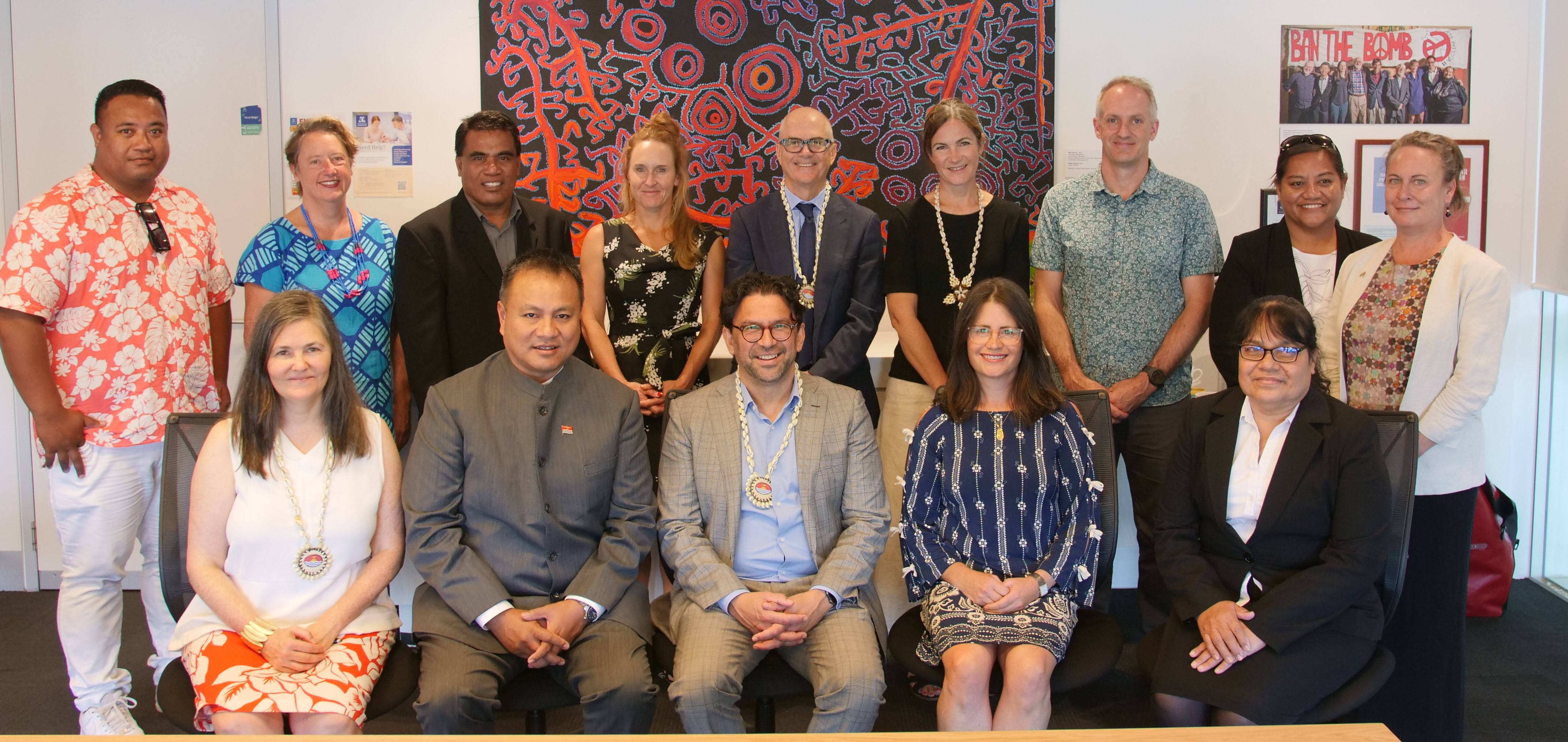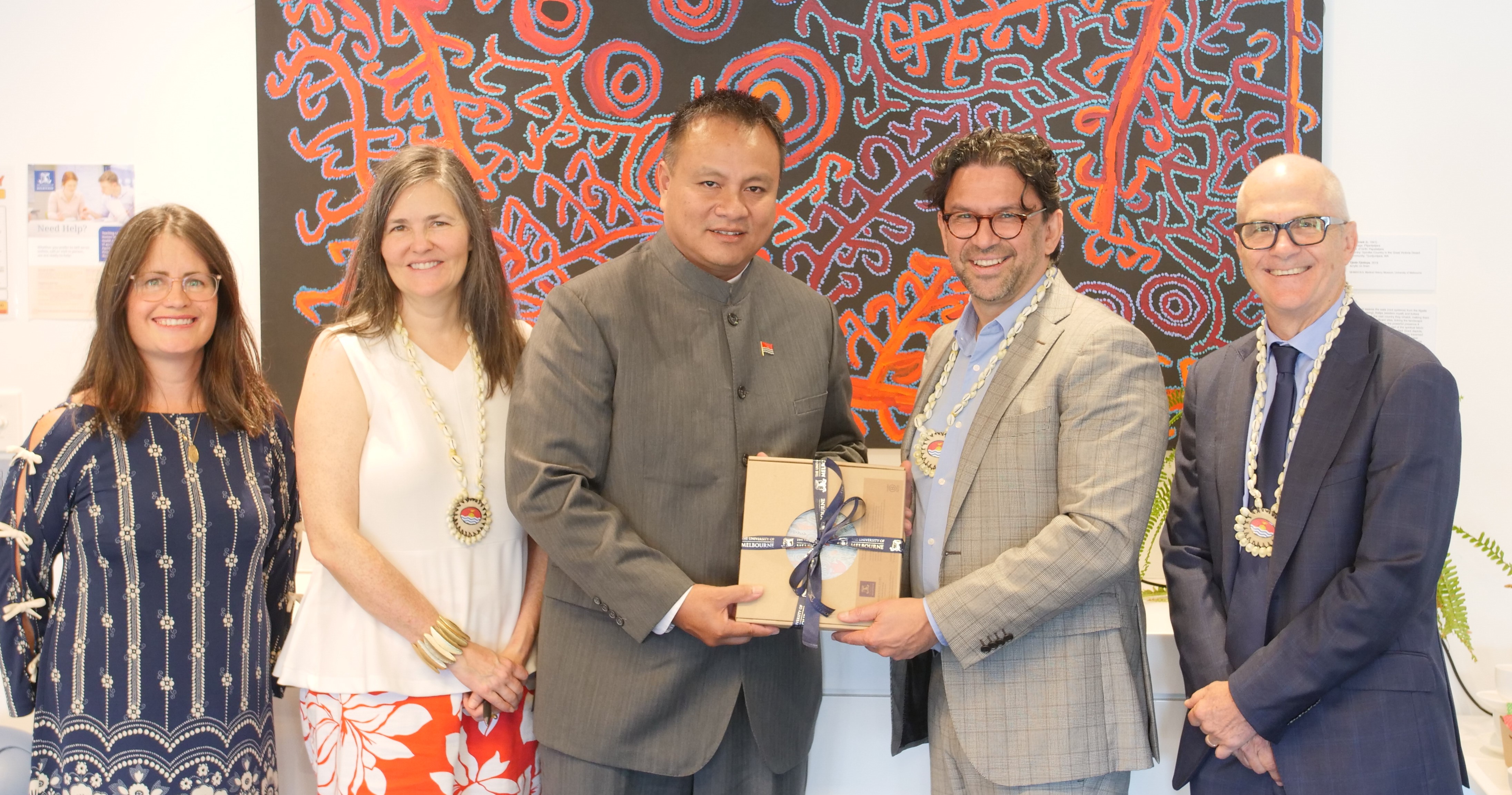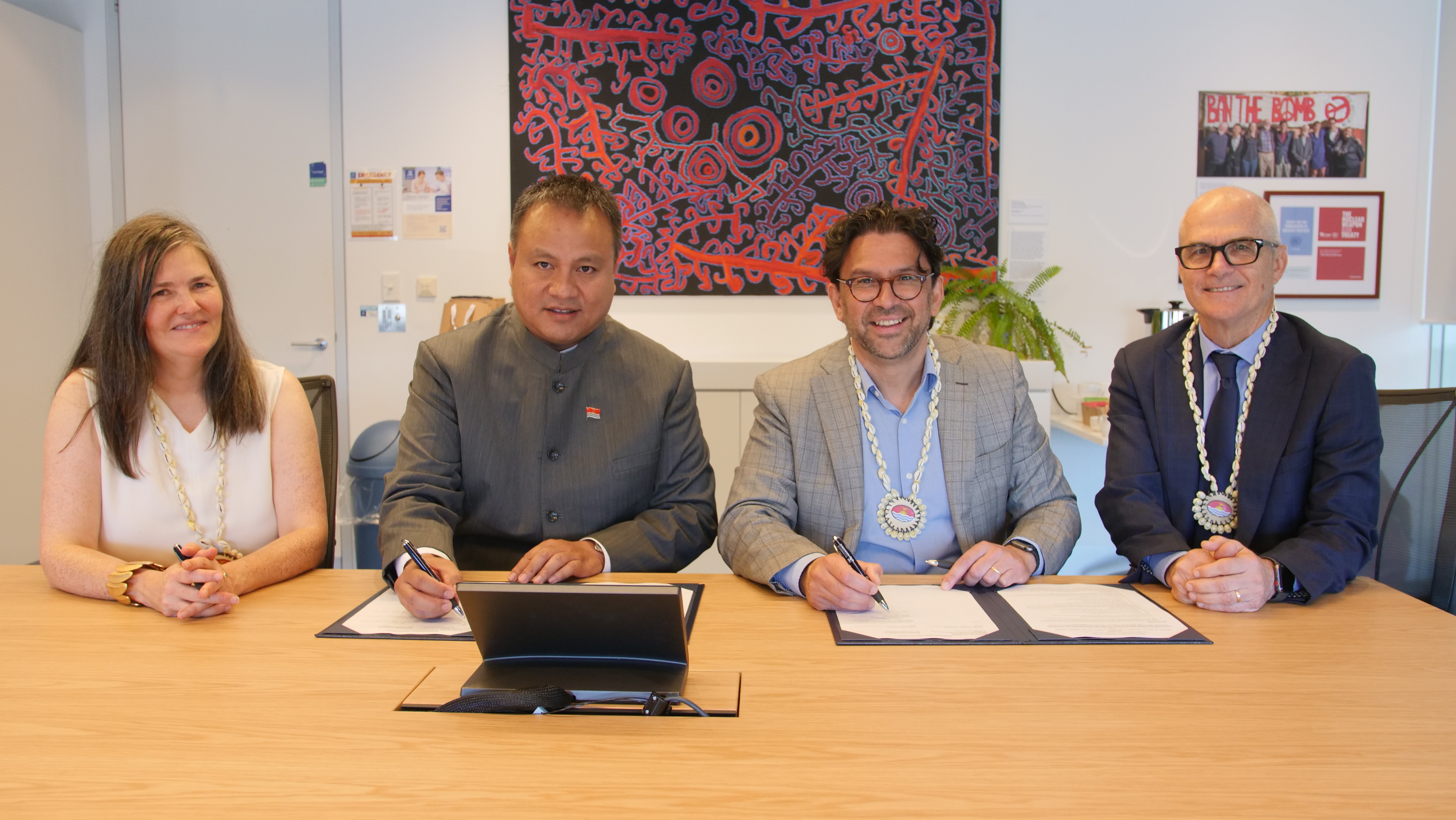Kiribati Minister for Health and Medical Services and the University of Melbourne sign a Memorandum of Understanding
A Memorandum of Understanding was signed between the University of Melbourne and the government of Kiribati, during their visit on the 21 February 2024.
The Honourable Dr Tinte Itinteang, Kiribati Minister for Health and Medical Services, Professor Michael Wesley, Deputy Vice Chancellor (Global, Culture and Engagement) and Professor Michael McGuckin, Deputy Dean, Faculty of Medicine, Dentistry and Health Sciences (MDHS) signed the Memorandum of Understanding during the Kiribati delegation visit to the University of Melbourne, to strengthen academic and research collaboration.
The delegation from Kiribati included the Honourable Dr Tinte Itinteang, Minister for Health and Medical Services; Ms Timuaki Barekiau, spouse of Dr Tinte Itinteang; Mr Tekoaua Tamaroa, Chief Physiotherapist; Dr Tanebu Tong, Acting Director, Public Health and Mrs Helen Murdoch, Director, Nursing Services.
Professor Nancy Baxter, Head of the School of Population and Global Health expressed deep gratitude for the visit that will strengthen connections between Kiribati and the University of Melbourne. She highlighted that there is much to be learned from each other and thanked the Minister and the delegation for making the journey to the university.
Professor Kathryn Bowen, Deputy Director of Melbourne Climate Futures acknowledged the strength of the partnership:
“We are seeing a really strong and growing partnership between the University and the Ministry for Health and Medical Services that comes from the connection we’ve made over many years – including with individual researchers and clinicians. In my particular area - the health impacts of climate change - we are very keen to partner to learn how to best support health systems so we can appropriately respond, in both Australia and Kiribati.”
“The health sector meeting that I attended in Kiribati last year was a fantastic way for me to gain a much deeper understanding of the work in our sector across all sorts of areas, in nursing, health information systems, women and children and infectious diseases. I’m delighted to see this formal step and the signing of the MoU. It really bodes well for a strong, positive collaboration,” she said.

“The memorandum goes beyond a mere formal agreement. It stands as a testament, a commitment and a promise to positively impact lives of the people we aim to uplift,” HM Dr Tinte Itinteang, Minister for Health and Medical Services said.
“Our union today signifies more than just an institutional alliance. It represents a fusion of minds; a dynamic force that is ready to redefine the landscape of capacity building and healthcare in Kiribati. But the core of our collaboration is not only to address the academic frontiers, but also the tangible challenges faced by many facets of our society. “
Kiribati has one of the highest rates of maternal and infant mortality; it is about ten times the rate of that here in Australia and New Zealand and the HM Dr Tinte Itinteang MP spoke of the pressing need to provide group B Streptococcal bacterial screening during pregnancy.
“It is not just a clinical concern. It is a call to action, resonating in the hearts of mothers and infants. It envisages a comprehensive approach; one that recognises the profound impact of our collective expertise, that can help save the lives and ensure the wellbeing of mothers and children,” he said.
HM Dr Tinte Itinteang MP also spoke about the need for the collaboration to tackle other pressing health issues that includes non-communicable diseases like diabetes and cardiovascular conditions and how scholarships provided by the university offer a lifeline of hope for those for whom dreams of higher education may have seemed distant.
Professor Mike McGuckin, Deputy Dean of the Faculty MDHS, spoke about the value the faculty places on its alumni and their success in their careers:
“It is great to have an alumnus of the faculty come back as a Minister for Health with such a growing ambition to improve the lives of people in your nation,” said Professor McGuckin.
“We are certainly living in a dynamic and volatile world and there is a lot to work on together with environmental challenges and health challenges. So, it is important that we build research partnerships and collaboration to build capacity across the Pacific region to meet these challenges together. This MOU is a formal foundation to enhance the partnerships that we already have and we’re really committed to build those into the future,” he said.
Professor McGuckin gave the example of the first time a Pacific Global Case competition held last year, where teams of young people from across the region came together at the university, or through a virtual connection, to come up with culturally appropriate and practical solutions to improve childhood nutrition in Kiribati.
Professor John Barnett, Director of the Oceania Institute spoke about how the Oceania Institute was an initiative of the 2030 Advancing Melbourne Strategy devised by Professor Michael Wesley to coordinate and profile the university’s engagement in the Pacific and to celebrate the strengths of the region.
With over 50 academic staff within the university, whose research is engaged with the region and 65 Masters students, Professor Barnett spoke about the opportunity to enhance collaboration within the university.
“People are really passionate about doing good things in the region. And all the work that goes on is very technical, very focussed on collaboration like public health, like conservation. They are just trying to solve problems, not just talk about them,” said Professor Barnett.
“We’re trying to strengthen relationships to leverage the university’s research better. In the last five years, the university has been involved in over 85 projects, worth over $64 million in funding, leading to over 200 publications and they are all engaged in every country in the region,” he said.

“What a great occasion, it comes as we launch the Oceania Institute, which is very much about recognising expertise and the interests we have as a university in the Oceania region. It’s also a statement that Australia is part of Oceania. With our neighbours and friends in Oceania, we are very much committed to working together to work on common challenges that we have. So, I see this MoU as very much part of that constellation of work that we’re doing,“ said Professor Wesley.
The visit from Kiribati delegates was highly successful and helped to deepen and strengthen the partnership with the University of Melbourne.
